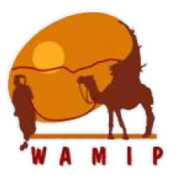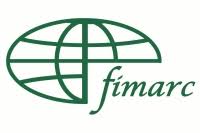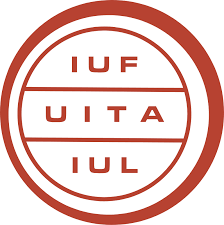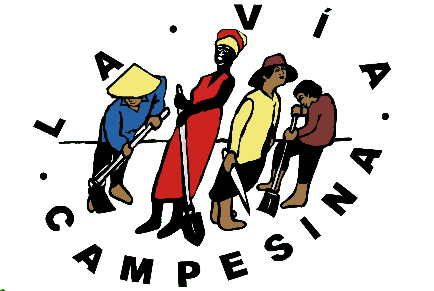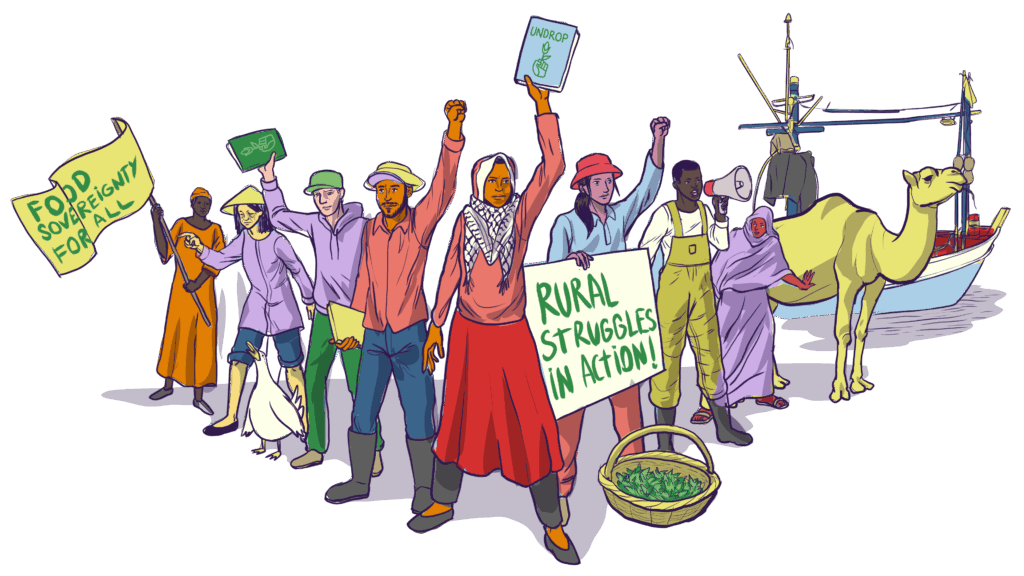
Defending the rights of rural peoples and workers: who are UNDROP’s rights holders?
The UN Declaration on the Rights of Peasants and Other People Working in Rural Areas (UNDROP) enshrines and protects the specifics rights of a wide array of rural constituencies. Article 1 of the Declaration defines UNDROP’s plurality of rights holders:
Article 1
1. For the purposes of the present Declaration, a peasant is any person who engages or who seeks to engage alone, or in association with others or as a community, in small-scale agricultural production for subsistence and/or for the market, and who relies significantly, though not necessarily exclusively, on family or household labour and other non-monetized ways of organizing labour, and who has a special dependency on and attachment to the land.
2. The present Declaration applies to any person engaged in artisanal or small-scale agriculture, crop planting, livestock raising, pastoralism, fishing, forestry, hunting or gathering, and handicrafts related to agriculture or a related occupation in a rural area.
It also applies to dependent family members of peasants.
3. The present Declaration also applies to indigenous peoples and local communities working on the land, transhumant, nomadic, and semi-nomadic communities, and the landless
, engaged in the above-mentioned activities.
4. The present Declaration further applies to hired workers, including all migrant workers regardless of their migration status, and seasonal workers, on plantations, agricultural farms, forests and farms in aquaculture and in agro-industrial enterprises
.
This broad spectrum of rights holders was an intentional political demand by grassroots rural organisations pushing the process forward at the United Nations alongside allied states and civil society organisations. This way, in addition to peasants, the UNDROP recognises the rights of various rural peoples who fought for it, meaning small-scale and livestock farmers, pastoralists, artisanal fishers, hunter-gatherers, artisans linked to agriculture, Indigenous Peoples, transhumant and nomadic communities, landless, wage workers, and migrant workers.
All these constituencies, represented by various organizations and social movements, some of international outreach, shared the conviction that a UN legal instrument of such kind was necessary to counter the constant violations of the rights of people working in rural areas – violations often perpetrated by transnational corporations and powerful agribusiness land barons in pursuit of private profit. They contributed to the drafting of the Declaration and emphasised the urgent need for such an instrument, not only to ensure the survival of rural areas and peoples, but also to guide legal and political efforts toward socioeconomic and environmental justice in rural territories, as well as fairer and truly sustainable food systems. The involvement of these diverse rural constituencies has strengthened the solidarity of rural populations and the shared destiny they hold.
It should be emphasised that, at present, new rural groups that were not originally envisaged within UNDROP’s scope are asserting their standing as rights-holders under the declaration — such as sea nomad communities.
Just like during the UNDROP negotiation period, our present struggle around UNDROP’s promotion and implementation concerns all rural constituencies whose rights are enshrined in the Declaration. Rural peoples’ and workers’ rights can now be legally and politically claimed, individually or collectively, vis-a-vis states, public authorities, multilateral institutions, as well as national, regional and international courts. In this sense, the UNDROP is an instrument whose implementation efforts unites a multiplicity of rural struggles at different levels and scales.
Webinar on UNDROP’s Rights Holders
In 2025, the annual public webinar held by the website Defending Peasants’ Rights delved particularly into the thematic of UNDROP’s rights holders. It was honoured by the distinguished presence of Ms. Shalmali Guttal, member of the UN Working Group on the UNDROP, who provided an overview and insightful interpretation of the Working Group’s understanding of Article 1 of the Declaration, which defines its rights holders.
Moreover, several rural constituencies – represented by global movements or organizations – participated in the rights holders’ panel, highlighting their struggles in the context of our shared efforts to implement the rural peoples’ rights enshrined in the UNDROP at both international and national levels. The following movements and organisations provided valuable inputs in this important meeting of UNDROP’s rights holders: the World Alliance of Mobile Indigenous People (WAMIP), International Federation of Rural Adult Catholic Movements (FIMARC), World Forum of Fisher Peoples (WFFP), International Union of Food, Agricultural, Hotel, Restaurant, Catering, Tobacco and Allied Workers’ Associations (IUF), Rural Women Assembly (RWA), La Via Campesina (LVC), and the Sea Nomads Contact Group.

